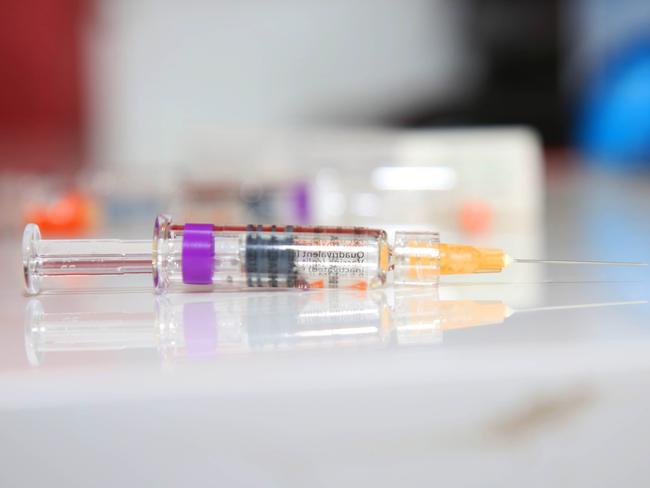All Australians urged to get flu vaccination as cases spiral across the country
Flu season is more than a month away but Australia’s peak medical body has warned we should get in early for a vaccine.
National
Don't miss out on the headlines from National. Followed categories will be added to My News.
The official start to flu season is still more than a month away, but experts are urging all Australians to roll up their sleeves and get vaccinated now.
The number of flu cases has been rising steadily around the country in recent weeks, pointing to an early start to the season, which typically begins in mid-May.
And this, combined with low vaccination rates, points to the potential for a tough few months.
While reporting for 2024 flu vaccination rates has not yet started, figures from the National Centre for Immunisation Research and Surveillance Australia show that in 2023, just 28% of children aged from six months to five years received a vaccine.
That number was even lower (16%) for the 5-15 years age group, followed by 22% for the 15-50 years age group, 37% for the 50-65 years age group and 63% for Australians aged 65 years and over.
According to the National Notifiable Disease Surveillance System, there were 32,485 cases of laboratory confirmed flu across Australia as of April 7.
This is a massive increase on the number of cases reported during the first quarter of 2023 (18,584).
NSW has recorded the most cases (13,153) so far this year, followed by Queensland (9015), Victoria (5649), South Australia (1852), Western Australia (1832) the ACT (424), Northern Territory (301), and Tasmania (259).
Last year was worst on record for reported flu case numbers (288,992) since 2019, when there were 313,647 cases notified.

Despite the fact that they are in the top three for flu cases, NSW and Victoria are yet to follow the lead of Western Australia and Queensland and offer all residents free vaccination for anyone in those states who cannot receive it for free under the National Immunisation Program (NIP).
In Queensland, the free program will run from April to September and will be available to all residents of the state aged six months and over.
Western Australian residents will be able to access free flu vaccines during May and June.
According to the National Immunisation Coalition, flu typically affects 5% to 10% of the community every year, however in more severe outbreaks that number can rise to 20%. The rate of infection is higher for children, with about 30% estimated to contract the flu every year.
In a typical year, flu is estimated to be responsible for 1.5 million lost workdays, more than 300,000 GP visits, and about 18,000 hospitalisations.
There are eight brands of flu vaccines available in Australia in 2024. These include egg-based vaccines (Vaxigrip Tetra, Fluarix Tetra, Afluria Quad, FluQuadri and Influvac Tetra), cell-based vaccines (Flucelvax Quad), adjuvanted vaccines (Fluad Quad) and high-dose vaccines (Fluzone High-Dose Quad).
Four vaccines on the list are available for free through the NIP for certain age groups and people with certain health conditions.
Those at highest risk of serious complications from influenza include children aged under five years, pregnant women, older Australians, Indigenous and Torres Strait Islander people, and those with underlying health conditions such as cardiac disease, chronic respiratory and neurological conditions, diabetes, renal disease, asplenia, haematological malignancies and impaired immunity due to disease or treatment. Flu vaccination is free for these people under the NIP.

Complications from flu can include acute bronchitis and otitis media, pneumonia (primary viral and secondary bacterial), cardiovascular complications such as myocardial infarction, myocarditis, pericarditis, stroke, encephalopathy, Reye syndrome, Guillain-Barre syndrome and death.
According to the National Immunisation Coalition, flu typically affects 5% to 10% of the community every year, however in more severe outbreaks that number can rise to 20%. The rate of infection is higher for children, with about 30% estimated to contract the flu every year.
In a typical year, flu is estimated to be responsible for 1.5 million lost workdays, more than 300,000 GP visits, and about 18,000 hospitalisations.
The Australian Technical Advisory Group on Immunisation (ATAGI), has provided a statement on the administration of seasonal influenza vaccines in 2024, which includes details which of the four vaccines on the list is available for free through the NIP and for which age group/health condition.
“Influenza vaccines can be co-administered (given on the same day) with any Covid-19 vaccine and other vaccines,” it says.
“While protection is generally expected to last throughout the year, the highest level of protection occurs in the first three to four months after vaccination.”
Other key points include:
•For adults aged 65 years and over, both the adjuvanted (Fluad Quad) and high-dose (Fluzone High Dose Quadrivalent) influenza vaccines are preferentially recommended over standard influenza vaccine. There is no preference for use between either Fluad Quad or Fluzone High-Dose Quadrivalent regarding protective benefits for this age group.
•Flucelvax Quad is now registered and available for use in children from six months of age (the minimum age for use was previously two years.) This vaccine is currently funded under the NIP for at-risk populations aged five to 64 years. There is no preference for use between Flucelvax Quad and standard dose egg-based influenza vaccines.
•If a person had a 2023 formulation of influenza vaccine in late 2023 or early 2024, they are still recommended to receive a 2024 formulation of influenza vaccine.

Speaking to ABC Radio, Australian Medical Association president Steve Robson said flu season was generally regarded as a winter illness, but recent years had seen it beginning earlier.
“So I think it makes perfect sense that everybody starts to attune to that really now and start to prep for the flu season,” he said.
He stressed the importance of understanding that flu vaccination was simple.
“It is safe, it’s very effective, and it’s something that can protect the whole community at a time of great threat and great risk to a lot of vulnerable Australians,” he said.
Australians are encouraged to get a Covid booster every six to 12 months, according to the Department of Heath’s website.
Those over 75 years should go every six months. For 65 to 74 year olds, it is at least every 12 months. Healthy 18 to 65 years olds are recommended to get a booster at least once a year. Healthy children aged five to 17 years old can be jabbed annually but the Covid vaccine is not recommended for kids under five.




